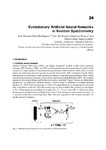
Please use this identifier to cite or link to this item:
http://ricaxcan.uaz.edu.mx/jspui/handle/20.500.11845/782| Title: | Evolutionary Artificial Neural Networks in Neutron Spectrometry |
| Authors: | Ortíz Rodríguez, José Manuel Martínez Blanco, María del Rosario Vega Carrillo, Héctor René |
| Issue Date: | Jul-2010 |
| Publisher: | IntechOpen |
| Abstract: | Artificial Neural Networks (ANN), are highly simplified models of the brain processes (Graupe, 2007; Kasabov, 1998). AnANNis a biologically inspired computational model which consists of a large number of simple processing elements called neurons, units, cells, or nodes which are interconnected and operate in parallel (Galushkin, 2007; Lakhmi & Fanelli, 2000). Each neuron is connected to other neurons by means of directed communication links, which constitute the neuronal structure, each with an associated weight (Dreyfus, 2005). The weights represent information being used by the net to solve a problem. Figure 1 shows an abbreviated notation for an individual artificial neuron, which is used in schemes of multiple neurons (Beale et al., 1992). Here the input p, a vector of R input elements, is represented by the solid dark vertical bar at the left. The dimensions of p are shown below the symbol p in the figure as Rx1. These inputs post multiply the single-row, R − column matrix W. A constant 1 enters the neuron as an input and is multiplied by a bias b. The net input to the transfer function f is n, the sum of the bias b and the product Wp. This sum is passed to the transfer function f to get the neuron’s output a. |
| URI: | http://localhost/xmlui/handle/20.500.11845/782 https://doi.org/10.48779/v5tr-9k63 |
| Other Identifiers: | info:eu-repo/semantics/publishedVersion |
| Appears in Collections: | *Documentos Académicos*-- UA Ciencias Nucleares |
Files in This Item:
| File | Description | Size | Format | |
|---|---|---|---|---|
| Evolutionary artificial2.pdf | 1,41 MB | Adobe PDF |  View/Open |
This item is licensed under a Creative Commons License
